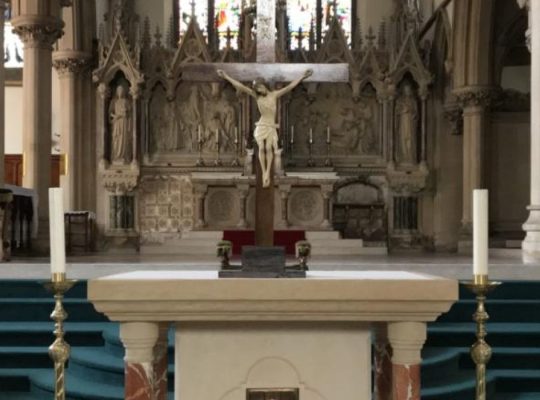After briefly recalling John the Baptist’s preaching, Jesus’ baptism, and his temptation in the desert, Mark comes to the announcement of the good news. From this beginning, the characteristics of Mark’s Gospel are given brisk narratives; energetic style; more action than speech; presentation of a Jesus always on the go, who invites others to follow him in haste, farther, always farther. At the same time, there are significant land marks and, at each turning point of the narrative, the pressing invitation to discover in Jesus ‘the Son of God.’
‘The beginning of the Gospel of Jesus Christ [Son of God].’ Set at the opening of Mark’s Gospel, this statement is equivalent to a postulate: Jesus is in himself, personally, the Good News. Everything that went before was preparing this manifestation which takes place ‘after John had been arrested,’ John the last of the prophets, whose preaching was brutally stopped, but who, through his martyrdom, gives supreme testimony to him whom he was announcing.
In order to manifest himself, ‘Jesus came to Galilee.’ Nazareth, where he had lived, belonged to this province. But he had left it in order to receive John’s baptism, then to remain in Judea, ‘in the desert for forty days.’ He is coming back to Galilee now; Mark though does not indicate exactly where in this vast province. Throughout his Gospel, he frustrates our curiosity. We would like to be able to follow on a map Jesus’ comings and goings, but such details are unimportant to Mark. He would rather focus his hearers’ and readers attention on the meaning of the urgency with which Jesus goes through this region and later, other regions. And he does so here. Owing to its mixed population and its geographical location, which made it a crossroads for trade, Galilee was called ‘the District of the Gentiles.’ To note that Jesus, the Good News, first goes to Galilee immediately suggests that, from the outset, his manifestation concerns all nations. Moreover, unlike John the Baptist, Jesus does not wait for people to come to him; he takes the initiative and goes to them in order to sow the word to the four winds.
As told by Mark, Jesus’ inaugural message appears general, if not vague. But we must take a closer look. ‘This is the time of fulfilment. The kingdom of God is at hand.’ This proclamation reminds us of what the Book of Isaiah announced before:
‘Go up onto a high mountain, Zion, herald of glad tidings; Cry out at the top of your voice, Jerusalem, herald of the good news! Fear not to cry out and say to the cities of Judah: Here is your God!’ (Isa 40:9)
‘He is near’ Such is the message of salvation proclaimed by Jesus, first in Galilee ‘the Galilee of the Nations,’ then beyond, to human beings of the whole earth. But he adds: ‘Repent and believe in the Gospel.’ This is a call to turn to Jesus and believe in him. His activity, his miracles, the expulsions of demons will show that God’s power is, in fact, acting in him, and Satan’s reign is tottering. Hence the question posed with growing acuteness: ‘Who is he? John the Baptist? One of the prophets?’ We shall be progressively led to decide among so many opinions and to renew our faith; we shall be led to agree with the same conclusion as Simon Peter: ‘You are the Messiah.’ Only then will Jesus be able to speak clearly of his death and resurrection, of the necessity for his disciples to follow him carrying their crosses. Such is the itinerary on which Mark guides us. By reporting at this point the call of the first four disciples, Mark completes the presentation of Jesus, Son of God.
Again, Mark omits details and limits himself to an extremely streamlined account. ‘As he passed by the Sea of Galilee,’ Jesus first sees Simon and his brother Andrew, then ‘a little farther,’ James the son of Zebedee, and his brother John. They are fishermen. Jesus finds them busy, Simon and Andrew casting their nets, James and John readying them to go fishing. ‘Follow me.’ ‘Then they left their nets……they left their father Zebedee in the boat along with the hired men an followed him.’
This episode demonstrates the extraordinary authority of Jesus’ word, which Mark will emphasise at every opportunity, showing that it works on everyone, even demons. The recognition of this authority and the unhesitating response to Jesus’ call are the earmarks of discipleship, whatever each one’s vocation and in whatever manner it is first known. This is the fundamental teaching of this narrative which Mark wants to give us without delay. He streamlines it to the utmost to throw it into sharp relief; he keeps only Jesus’ call and the four disciples’ immediate response. Of course, we cannot conclude that, in reality, things happen—or ought to happen—this way.
On the one hand, the Lord’s call does not directly reach us, as in the case of the first four apostles. Even when loud and clear to the recipient, an inner call must be verified and tested by those who have received the gift and the ministry of discernment. Prudence is the more in order since no-one is free of the risk of illusions whose consequences can be very serious for oneself and others. ‘Do not quench the Spirit. Do not despise prophetic utterances. Test everything; retain what is good.’ (1Thess 5:19-21) ‘Beloved do not trust every spirit but test the spirits to see whether they belong to God.’ (1 John 4;1) The spiritual tradition attests to the necessity and the wisdom of this prudent course. God’s call does not eliminate the human mediations he himself has willed.
On the other hand, the Lord’s call, even a sudden one, is always inserted within a history. As a rule, it is communicated in such a discreet and hardly perceptible manner that people become conscious of it only gradually, following the rhythm of divine preparations. But one thing is certain: conversion is always a free response of the human being to the initiative of a call from God.
According to his custom of coming to us wherever we are and taking us as we are, Jesus calls Simon, Andrew, James, and John when they are at work near the shore of the Sea of Galilee. Jesus speaks to these four men about what they are presently doing to express what he has in store for them. ‘I will make you fishers of men.’ We do not have here a kind of ‘by the way,’ a pun whose meaning could remain ambiguous. In current usage, people speak of nets as snares set for human beings as well as for birds and fish. But Jesus does not refer to this meaning of the word when he says to them, as they are occupied with casting or mending their nets, ‘I will make you fishers of men.’ There is nothing in Jesus’ ministry, nothing in the precepts he gives the disciples, nothing in the way the disciples will exercise their apostolate to suggest, even faintly, an attempt to entrap anyone. On the contrary, even though Jesus’ and the Apostles’ preaching urges people to be converted and believe, it always challenges them to face their personal responsibility and asks them for their free commitment: ‘Whatever place does not welcome you or listen to you, leave there, and shake the dust off your feet.’
In the Bible, the sea evokes a fearful place that strikes the imagination and on which it is dangerous to venture—a lair of monsters, a destructive force. To pull people out of the sea is not to drag them in a net out of their natural element, but to snatch them from a bad world, to free them from the powers of evil, for the kingdom of heaven when, on Judgement Day, the sorting out will take place. By making them ‘Fishers of men,’ Jesus calls the fishermen of the Sea of Galilee ‘that they might be with him and he might send them forth to preach and for them to have the authority to cast out demons.’ The kingdom of heaven is at hand; thus this brief narrative delineates the mission of the Church, even with a discreet allusion to the role of Peter, already named first.
Mark goes directly to the call of Simon, Andrew, James, and John, whom Jesus recruits on the shores of the Sea of Galilee in order to make them fish for people. Mark wants to make it clear that from Jesus’ first appearance, the time of mission has begun; we must hurry to recognise the Son of God and to follow him without hesitation or delay. Our Lord’s call to these first four apostles is a call to us all, echoing throughout the ages ‘FOLLOW ME.’ And to some who will also hear: ‘AND I WILL MAKE YOU FISHERS OF MEN.’


